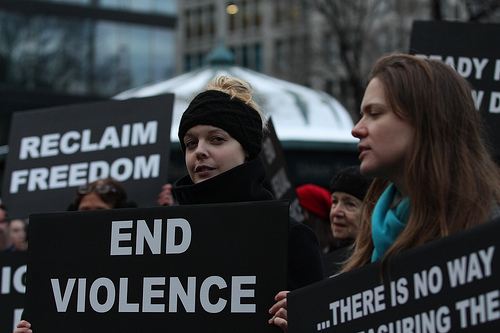Time magazine has a series of editorials and a cover story (behind a paywall) on the campus sexual assault crisis, and it’s a pretty good place to start if you haven’t been following the issue and want to understand the fault lines and some of the leading characters shaping the public debate.
Vice President Joe Biden has a short piece on the White House’s efforts to apply pressure to college presidents and administrators, New York Sen. Kirsten Gillibrand writes about her current efforts to address sexual assault, activist Jaclyn Friedman explains the importance of holding schools accountable and survivors share their stories of doing exactly that.
Time also invited Christina Hoff Sommers to do what she does, which is to pretend rape culture is a paranoid feminist delusion and that campus rape is just a lot of regretted sex or ploys by vengeful female undergrads to ruin the lives of unsuspecting young men. Caitlin Flanagan is unusually restrained in her short piece on fraternities and transparency, and manages not to say anything dismissive or snide about rape.
You can check the entire feature out at Time, but here are a few major takeaways from some of the contributors:
Joe Biden
I believe that the vast majority of college presidents are right minded and like stockholders putting pressure on CEOs, the White House wants to put pressure on them to change. You don’t want to be a school that mishandles rape. Guess what? Step up. It’s time.
Kirsten Gillibrand
Part of the problem is a pure lack of understanding of the true nature of campus sexual assault. These are not dates gone bad, or a good guy who had too much to drink. This is a crime largely perpetrated by repeat offenders, who instead of facing a prosecutor and a jail cell, remain on campus after a short-term suspension, if punished at all. […]
As a first step [to increase reporting rates], I teamed up with Missouri Senator Claire McCaskill, a former sex crimes prosecutor and powerful voice for victims, to secure the resources we need to investigate more cases, and enforce the laws we have. As it stands today, the federal agencies in charge of enforcing campus sex assault laws are left to a fraction of the funding and staff needed to be effective. And without the right oversight, nearly two-thirds of schools are failing to even report crime statistics as they are required to by current law.
Jaclyn Friedman
Most campus rapes are committed by a small number of perpetrators who pursue victim after victim unless they’re stopped. When we squelch victims’ efforts to hold our schools accountable, it leaves those repeat offenders free to attack again. That leads to campuses with more rape, and more victims whose trauma keeps them from fully pursuing their own education and contributing to the college community in all the ways that can make a campus great.
When it comes to addressing campus rape, the financial incentives for schools are inverted: schools that succeed at suppressing victim reporting benefit from the impression that they don’t have a “rape problem,” while the schools that encourage reporting risk a bad reputation and drop in donations. The way to change that dynamic is to raise the cost of schools sweeping it under the rug.
Emma Sulkowicz, Columbia University student and sexual assault survivor
I was raped by a fellow classmate the first day of my sophomore year. I didn’t report it at first because I didn’t feel like dealing with the emotional trauma. But then I met two other women who told me the same person who had assaulted me assaulted them, and I decided I had to do something. We all reported our cases, and all three were dismissed. […]
Ultimately they decided he wasn’t guilty. I appealed, but appeals go to the dean who basically has the autonomy to make the final decision for every case of sexual assault on campus. That’s not right. They either must find a disinterested party or they should train him because he hasn’t been trained to know to deal with survivors.
Every day, I am afraid to leave my room. Even seeing people who look remotely like my rapist scares me.
Christina Hoff Sommers
Once again, conspiracy feminists are at the forefront of this movement [against campus sexual assault]. Just as feminist psychologists persuaded children that they had been abused, so women’s activists have persuaded many young women that what they might have dismissed as a foolish drunken hookup was actually a felony rape. “Believe the children,” said the ritual abuse experts during the day care scare [of the 1980s]. “Believe the survivors,” say today’s rape culturalists. To not believe an alleged victim is to risk being called a rape apologist.
Some will say that these moral panics, while overblown, do call attention to serious problems. This is deeply mistaken. The hysteria around daycare abuse and campus rape shed no light: rather they confuse and discredit genuine cases of abuse and violence. Molestation and rape are horrific crimes that warrant serious attention and vigorous response. Panics breed chaos and mob justice. They claim innocent victims, undermine social trust, and teach us to doubt the evidence of our own experience.

